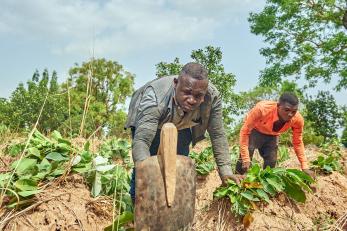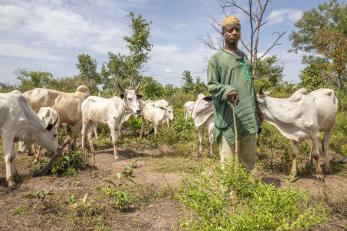Unveiling the farmer-pastoralist conflict in Nigeria

The farmer-pastoralist conflict has become Nigeria’s gravest security challenge, now claiming six times more lives than the Boko Haram insurgency in 2018, with more than 7,000 deaths in five years. It is costing Nigeria roughly $13 billion annually due to the mass destruction of properties, livestock and crops predominantly in the Middlebelt region of Nigeria.
In the midst of this grave insecurity, Mercy Corps Nigeria addresses these challenges in two states in the Middlebelt region gravely affected by the conflict through the USAID-funded Engaging Communities for Peace in Nigeria (ECPN) program. Through a randomized controlled trial (RCT) carried out in the communities we work in, we found out that the peace conditions in the communities ECPN worked in stayed the same or improved, while in the communities we did not work it stayed the same or deteriorated. In our first-ever impact evaluation, we now have evidence that speaks to the impact and effectiveness of peacebuilding during an active conflict.
All our activities were aimed at peacefully reducing and preventing violence between farmers and pastoralists, from which we have many lessons, successes, challenges and opportunities to learn from. By creating community-driven early response and early warning systems in the ECPN sites, our communities remained resilient during a particular uptick in violent attacks and clashes due to a discriminatory law that was passed. MCN activities were able to foster increased trust amongst pastoralists and farmers in our sites. Now, we know there is a crucial need to match community-level peacebuilding efforts with high-level advocacy so that government policies bolster local interventions rather than hinder them. Also, by organizing separate activities for women and sensitizing men to encourage women’s participation in our activities, MCN was able to increase women’s participation in peace-building activities given that we initially experienced low participation due to religious and cultural limitations.

In our bid to gain a deeper understanding of the root causes and dynamics of the conflict, Mercy Corps conducted an ethnographic study, “No Tribe in Crime”, to develop a deeper understanding of the changing dynamics among pastoralist groups, unveil some common misconceptions around the drivers of conflicts between farmers and different pastoralist groups, and the ways in which these complex dynamics and misconceptions affect and are affected by conflict.
Central to all of the study’s findings are that pastoralists face increasing challenges and threats to their way of life and security, and they struggle to adapt to these challenges. Pastoralists cited the expansion of farming areas into grazing routes and reserves and insufficient pasture as their primary challenge, in addition to changing weather patterns, causing them to move their cattle to new places with more fertile ground, which exposes herds to new diseases. They also spoke of decreased social cohesion with farmers and increasing fears of violence.
MCN’s latest program, Communities’ Initiatives to Promote Peace (CIPP), is a five-year, USAID funded program that builds upon our wealth of knowledge and resources to ensure impact in reducing the effects of the farmer-pastoralist conflict in our six new Middlebelt states.
Here are quick links to some of Mercy Corps Nigeria’s key resources on the farmer-pastoralist conflict: